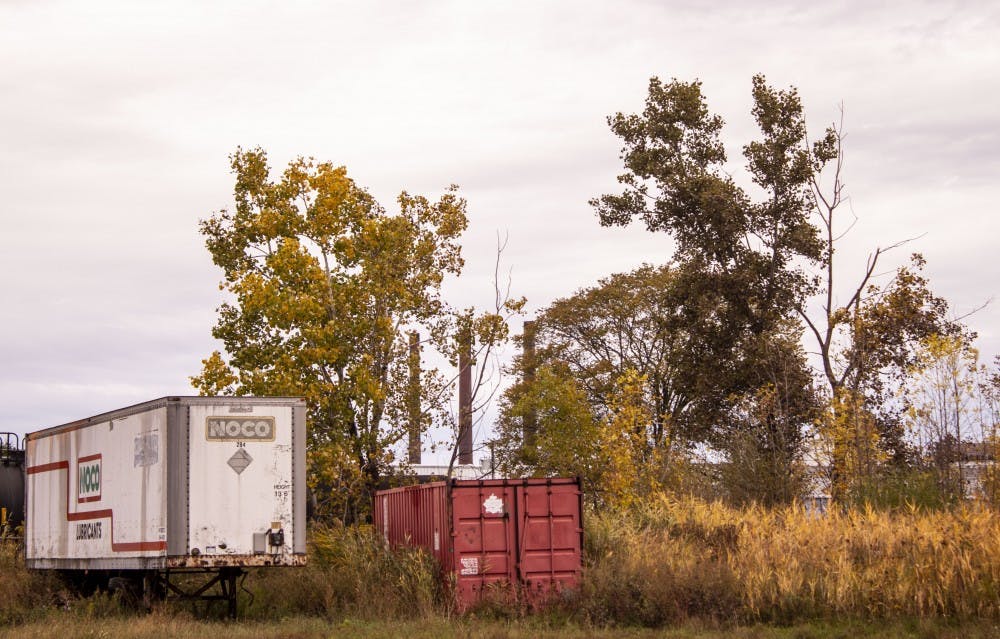Local activists are upset with UB for its role in environmental studies on the former Tonawanda Coke plant.
The plant, which manufactured coke –– a fuel made by heating coal or oil –– was convicted in 2013 for violating the Clean Air Act and the Resource Conservation and Recovery Act. Judge William Skretny ordered Tonawanda Coke to pay $711,000 for a soil study and $11.4 million to conduct an Environmental Health Study researching the plant’s effects on local residents and to open an environmental health education center. The plant gave UB $9.4 million in November 2016 but didn’t pay the remaining $2 million, according to UB spokesperson Cory Nealon. Tonawanda Coke operated for 101 years before shutting down in October 2018 due to bankruptcy.
The researchers of Citizen Science Community Resources began the soil study as a collaboration with UB chemistry professor Joseph Gardella and Fredonia professor Michael Milligan to understand how the Tonawanda Coke plant contaminated the town’s soil.
Jackie James, CSCR’s founder, started researching the plant in 2004 after being diagnosed with fibromyalgia in 2001.
She believed, like other community members, that the air made her sick. The research group James previously ran –– then Toxic Tonawanda, now known as the Clean Air Coalition of Western New York –– conducted an air study the same year, finding high levels of benzene, a known carcinogen. The group said the plant was responsible.
James has since recruited community members and formed CSCR to conduct more studies on residential areas surrounding the plant.
James said a not-for-profit was needed to handle the soil study’s funds, and members chose the SUNY Research Foundation to take charge. She said the soil study’s first 10 months were “fine,” until UB started to lead it.
Now, CSCR is concerned with UB’s “lack of transparency” with the millions of dollars and soil-testing data. Gardella said UB will present the data once it is finalized.
“We want to see the data,” James said. “None of this money would’ve come about if it weren’t for the 16 years we’ve been fighting for justice.”
A UB Sponsored Programs administrator distributes research funds to the research team and follows “federal and state procedures,” according to Matthew Bonner, a UB principal investigator for the Environmental Health Study. He said all expenditures are approved by UB Sponsored Programs and the team has to “provide rationale for everything” it purchases.
Bonner said his team designed the Environmental Health Study to understand how emissions from Tonawanda Coke and other sources could have influenced diseases within the community and sent out 100,000 questionnaires to adults around the plant in September 2018. Researchers received about 13% of questionnaires in return.
Bonner says the research team is in an “interactive exchange” with the community.
James disagrees.
James said she’s been interested in coming to advisory committee meetings but hasn’t received a response as to where and when the meetings are.
“I’ve even asked local elected officials and they don’t know anything about it so that’s really concerning to me,” James said.
As part of the court’s orders, UB opened the center in October 2016 to educate the public on the Environmental Health Study.
But UB has not been involved since July 2018.
James said the center’s operations are now funded on donations.
“Obviously we need help and the community wants this.” James said. “But why does the community have to struggle when UB was given $10 million to do this?”
Bonner said the committee suggested postponing educational activities until it had studies to share. UB said it is working on developing workshops to educate the community about environmental health.
“There may be better, more efficient ways to reach out and connect with these communities than a single site,” Bonner said. “We think we would be able to reach more people that way, rather than having a place just sitting there waiting for people to show up.”
The research team submitted expense reports to the U.S. Probation and Pretrial Services in November 2018 and didn’t hear back about any concerns, according to Bonner. The study also has an institutional review board at UB which protects study participants from harm caused by research.
CSCR asked UB to release the data from the soil study, fund the center, release its budget to the Department of Justice or a third party and to involve CSCR in the research.
“[The] Department of Justice wrote a letter to the president of UB saying that by Nov. [22] they have to hand over or submit financials and they have to reply to our lawyer’s letter,” James said. “So that’s a small win, but we’re going in the right direction.”
CSCR is not ruling out working with UB again.
“We’re already trying to heal and get over this situation with Tonawanda Coke and now we have to deal with this situation with UB,” James said. “We’re tired of this, but we’re not going to give up. We want to be able to move forward and heal.”
News desk can be reached at news@ubspectrum.com.

Alexandra Moyen is the senior features editor of The Spectrum.
Brittany Gorny is the senior news editor.





